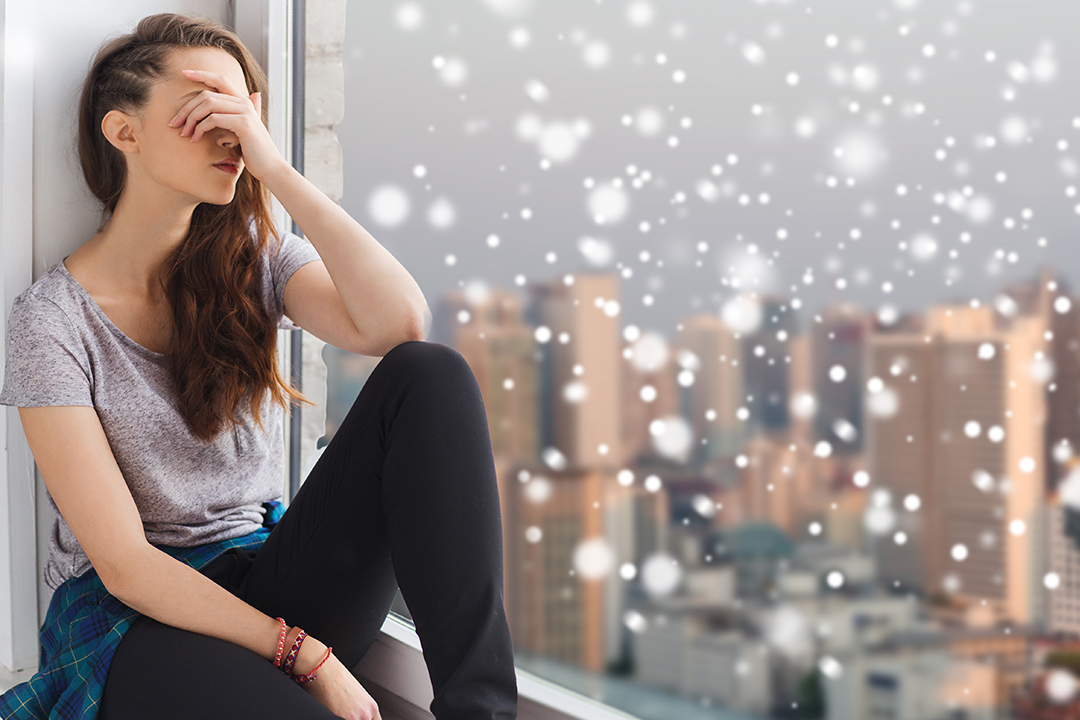By John DiConsiglio
Amid the family gatherings, parties and gift-giving, the holiday season overflows with joy and good cheer—or does it? Many people feel out of step with ruddy-cheeked revelers, particularly in the wake of a divisive election year. While so-called “holiday depression” is hard to define—and, as a psychological phenomenon, may not actually exist—experts caution not to dismiss it as merely a case of the blues. Some significant psychological issues can be tied to this time of year, ranging from Seasonal Affective Disorder (SAD) to heightened stress to intense feelings of sadness among people dealing with loss.
“A lot of people experience the holidays as a stressful time, and we know that stressful events tend to trigger depression and sadness,” said James Sexton, assistant professor of professional psychology. “So, to that extent, holiday depression is very real.”
Sexton and other Columbian College scholars emphasize the importance of recognizing the symptoms of seasonal depression and treating them like one would any illness. Euphemisms like the “holiday blues” diminishes the real difficulties people face as the calendar turns to fall, making it harder for sufferers to spot the signs of depression and for health care professionals to diagnose and treat it.
“Everyone has the blues,” said Associate Professor of Clinical Psychology Sherry Molock. “But the way you may be feeling—fatigued, withdrawing from things you find pleasurable, trouble sleeping or concentrating, not having the energy to engage in conversation—that’s not normal. That’s not just having a bad day.”
From a research standpoint, there are scant—if any—studies supporting the idea that the incidence of depression is higher around the holidays, said Professor of Psychology George Howe. In fact, he suggested, the opposite may be true. “The findings seem to lean towards the holidays as a time when people generally feel better,” he noted. “There is some evidence that people feel worse once the holidays are over, when they don’t have friends and loved ones around them and they return to work and their regular routines.” It is possible that certain people are more depressed during the holidays, Howe added, "but there is no research as yet identifying who that might be."
Professor of Psychology George Howe
Indeed, some depressive conditions that seem to relate to the holidays may well be caused by other factors. Molock noted that for those mourning a recent loss—from the passing of a loved one to a change in their job status—the holidays can be especially challenging. “This may be the first year you had to significantly change your lifestyle. Or you are facing the first holiday without someone you care about,” she said. “That’s not something to take lightly. Holidays can sometimes be difficult for people who have experienced losses because we associate holidays with a time to gather and fellowship with family and friends.”
Likewise, Seasonal Affective Disorder (SAD)—a recurrent depressive state-of-mind triggered by changing seasons—is often mistakenly attributed to holiday depression because it occurs at the same time of year. Many people with SAD develop depression symptoms during the fall and continue to feel sad throughout the winter. Most people stop having symptoms during the spring and summer, but the pattern re-occurs the following year. “It’s not the holidays per se that are the source of depression,” Molock said. “It just so happens that Thanksgiving and Hanukkah and Christmas all coincide with the time when most people are affected by SAD."
SAD sufferers often benefit from phototherapy—prolonged daily exposure to a bright light that elevates serotonin levels—along with sleep, exercise and, in some cases, antidepressants. “I tell clients to start phototherapy in September before the season changes,” she said, “and to treat themselves the way they would want to treat a friend.”
Easing Expectations
But even for people who have not experienced loss or a disorder like SAD, holiday pressures can magnify stress and anxiety—particularly when everyone else seems to be having a great time. “The holidays are portrayed in the media and held out socially as times that are happy and easy and should come naturally to all of us,” said Richard Ruth, associate professor of clinical psychology in the Professional Psychology Program. “If someone feels outside of those expectations, it can be kind of a double blow. Persons who have this experience can be left feeling unhappiness that can come with the holidays compounded by the sense that they must be doing something wrong because they are supposed to be happy.”
Ruth advocates considering the possibility of keeping holiday expectations modest and easing the self-imposed burden of trying to construct a TV-perfect holiday. “For some people the holidays are truly a wonderful time. For others, it’s more a matter of finding a way to get through them.” Either, he noted, is a legitimate response to the season—despite what the smiling pictures on your friends’ Facebook feeds would have you believe. In fact, Sexton said the holidays can be a good time to take a Facebook vacation. For individuals with fear of rejection and abandonment—also known as relational depression—the stream of social media merrymakers can worsen a feeling of exclusion. “This feeling of being excluded is like a visual illusion, but it still has an impact," he said. "I’d advise them to set up time to be with people in advance—in person, skype or phone—then step away from Facebook and don't look at their phones for awhile.”
If the traditional holiday routine puts someone in conflict with family—perhaps a parent disapproves of a partner or family members find themselves on opposite ends of the election spectrum—Ruth suggests turning to alternative holiday celebrations, like volunteering, choosing a community event over family dinner or spending an afternoon at the movies with a friend who is also seeking relief from holiday stress. “It’s OK to design a holiday in a way that is satisfying for you,” he said. “Don’t feel like you are boxed into a corner. There's not one right way to do it. Not all of our holidays have to look alike.”



